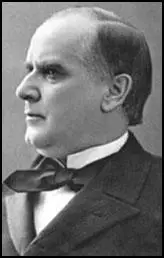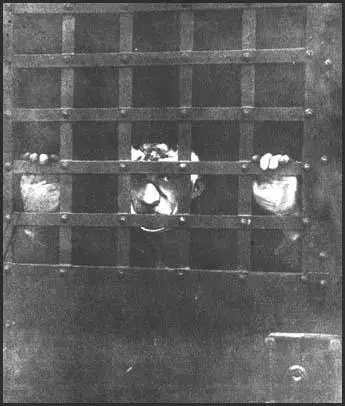William McKinley

William McKinley was born in Niles, Ohio, on 29th January, 1843. McKinley served in the Civil War and after retiring as a major in 1867 he became a lawyer in Canton, Ohio.
McKinley, a Republican, was elected to Congress in 1877. A stanch supporter of protectionism, in 1890, as chairman of the Ways and Means Committee, he helped to raise duties on foreign imports. After being defeated in 1890, McKinley served two terms as governor of Ohio (1892-96).
McKinley was selected by the Republican Party as their candidate in the 1896 presidential election. During the campaign against the Democratic candidate, William Jennings Bryan, McKinley argued for high protective tariffs on foreign goods. This message was popular with America's leading industrialists and with the support of Mark Hanna, McKinley was able to raise $3,500,000 for his campaign. Outspending Bryan by 20 to 1, McKinley easily defeated his opponent by an electoral vote of 271 to 176.
After his election McKinley revised customs duties upwards (the Dingley Tariff). He was soon involved in a foreign policy crisis with the Cuban insurrection. In the short war that followed the United States defeated Spanish forces in Cuba. McKinley was accused of imperialism when he declared that Puerto Rico and the Philippines must not be allowed to "fall into unfriendly hands" and made them United States dependencies.
McKinley was re-elected in 1900 but the following year on 6th September, was shot by the anarchist, Leon Czolgosz while visiting the Pan American Exposition in Buffalo. Although surrounded by fifty bodyguards, Czolgosz was able to walk up to McKinley and fire two shots at him. Hit in the chest and abdomen, McKinley shouted out "Be easy with him, boys" as secret service agents beat Czolgosz with fists and pistol butts.
William McKinleywas taken to hospital where it was discovered that the chest wound was superficial but the other bullet had torn through the stomach wall. For the first few days his condition improved and newspapers reported that he would recover. However, the path of the bullet that had passed through the wall of the stomach and his kidney, had turned gangrenous and he died on the 14th September, 1901. McKinley was replaced by his vice-president, Theodore Roosevelt.

William McKinley in September, 1900.
Primary Sources
(1) Robert La Follette, Autobiography (1911)
William McKinley drew men to him by the charm, courtliness, and kindliness of his manner. McKinley was a magnetic speaker; he had a clear, bell-like quality of voice, with a thrill in it. He spoke with dignity, but with freedom of action. The pupils of his eyes would dilate until they were almost black, and the face, naturally without much colour, would become almost like marble - a strong face with a noble head.
I know of my own knowledge that McKinley stood against many of the corrupt influences within his own party - that he even stood firmly against the demands of his best friend, Hanna.
(2) The Wichita Daily Eagle (7th September, 1901)
It was shortly after 4 p.m. when one of the throng which surrounded the presidential party, a medium sized man of ordinary appearance and plainly dressed in black, approached as if to greet the president. He worked his way amid the stream of people until he was within two feet of the president.
President McKinley smiled, bowed and extended his hand in the spirit of congeniality his American people so well know, when suddenly the sharp crack of a revolver rang out loud and clear above the hum of the voices, the shuffling of myriad feet and vibrating waves of applause.
There was an instance of almost complete silence. The president stood stood still, a look of hesitancy, almost of bewilderment on his face. Then he retreated a step, while a pallor began to steal over his features.
Then came a commotion. Three men threw themselves forward, as with one impulse, and sprang toward the would-be assassin. Two of them were United States secret service men who were on the lookout, and whose duty it was to guard against such a calamity. The third was a by-stander, a negro, who had only an instant previously grasped the hand of the president. In a twinkling the assassin was borne to the ground, his weapon was wrestled from his grasp, and strong arms pinioned him down.
(3) The New York Times (8th September, 1901)
All the official bulletins showed great gains and inspired those near the President to state positively that he would recover rapidly. The strain on the heartstrings of the Nation has been relieved.
(4) Jane Addams, Twenty Years at Hull House (1910)
When Peter Kropotkin came to America to lecture, he was heard throughout the country with great interest and respect; that he was a guest at Hull House during his stay in Chicago attracted little attention at the time, but two years later, when the assassination of President McKinley occurred, the visit of this kindly scholar, who had always called himself an "anarchist" and had certainly written fiery tracts in his younger manhood, was made the basis of an attack upon Hull House. It is impossible to overstate the public excitement of the moment and the unfathomable sense of horror with which the community regarded an attack upon the chief executive of the nation, as a crime against government itself which compels an instinctive recoil from all law-abiding citizens.
